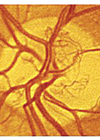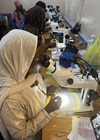Diabetic retinopathy (DR) is the most common form of diabetic eye disease, characterised by exudates, microaneurysms and haemorrhage. Early diagnosis is crucial for preventing visual loss. The risk of developing diabetic retinopathy is known to increase with age as well as with less well controlled blood sugar and blood pressure level, however, the identification of biomarkers that could lead to presymptomatic or early recognition of DR would be a significant step forward. Currently genetic studies have shown association with disease development and identified long non-coding RNAs and extracellular matrix proteins as linked to DR. This study investigated alternative splicing events of pre-mRNA transcripts which is an important gene regulatory process that adds to the complexity of the protein profile. Sixty-seven RNA samples from DR patients were compared to 28 patients with diabetes but without retinopathy. Genome-wide transcriptome analysis was performed and results validated by polymerase chain reaction (PCR) and cDNA sequencing. The results identified Tubulin, Delta-1 (TUBD1) splicing events as different between the two cohorts of patients. Hypoxia-inducible factor-1, a molecule that plays an important role in DR is a direct regulator of TUBD1, suggesting biological relevance to the findings. The data supports the potential for TUBD1 RNA isoform expression as a predicting biomarker for DR.







